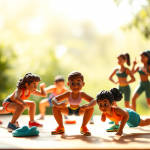Starting a fitness journey as a beginner is both exciting and daunting. The promise of improved health, increased energy, and a stronger body is motivating, but the path is often filled with obstacles. From unrealistic expectations to physical discomfort, beginners face unique challenges that can derail progress if not addressed. This article explores the common hurdles of beginner fitness, mistakes to avoid, and the critical roles of hydration and stretching in creating a sustainable routine. With the right mindset and knowledge, you can set yourself up for long-term success.
Common Challenges for Beginner Fitness Enthusiasts
Embarking on a fitness journey comes with its share of difficulties, especially for those new to exercise. Understanding these challenges can help you prepare and stay committed.
1. Unrealistic Expectations
One of the biggest hurdles for beginners is setting unrealistic goals. Inspired by social media or fitness influencers, many expect rapid transformations, like losing 20 pounds in a month or achieving a toned physique in weeks. These expectations often lead to frustration when results don’t materialize quickly. Fitness is a gradual process, and sustainable changes take time. Setting small, achievable goals—like working out three times a week or walking 10,000 steps daily—helps build confidence and momentum.
2. Lack of Knowledge
Without proper guidance, beginners may struggle to create an effective workout plan. Questions like “What exercises should I do?” or “How many reps are enough?” can feel overwhelming. Misinformation from unreliable sources can also lead to ineffective or unsafe practices. Investing time in learning basic fitness principles or consulting a certified trainer can provide clarity and direction.
3. Physical Discomfort
Soreness, fatigue, and even minor injuries are common when starting a fitness routine. Muscles unaccustomed to exercise may ache after workouts, and this discomfort can discourage beginners. While some soreness is normal (known as delayed onset muscle soreness or DOMS), pushing through pain can lead to injury. Listening to your body and allowing adequate recovery time is crucial.
4. Time Management
Finding time to exercise in a busy schedule is a significant challenge. Work, family, and social commitments often take priority, leaving little room for workouts. Beginners may also overestimate how much time they need, thinking every session must last an hour. Short, consistent workouts—such as 20-minute bodyweight circuits—can be just as effective for building a habit.
5. Motivation Fluctuations
Staying motivated is tough, especially when results are slow or life gets in the way. Beginners often rely on initial excitement, but this can fade. Building intrinsic motivation—focusing on how exercise makes you feel rather than how it makes you look—helps sustain effort over time. Tracking progress, like improved strength or stamina, can also keep you engaged.

What Not to Do: Common Beginner Fitness Mistakes
Avoiding pitfalls is just as important as adopting healthy habits. Here are key mistakes to steer clear of when starting your fitness journey.
1. Overtraining
In their enthusiasm, beginners often do too much too soon. Exercising every day without rest or lifting weights that are too heavy can lead to burnout or injury. Rest days are essential for muscle recovery and growth. A balanced routine with 3–5 workouts per week, including rest or active recovery days, is ideal for most beginners.
2. Skipping Warm-Ups and Cool-Downs
Jumping straight into intense exercise without warming up increases the risk of injury. A 5–10-minute warm-up, like light cardio or dynamic stretches, prepares your muscles and joints. Similarly, skipping cool-downs can leave muscles tight and prone to soreness. Incorporate static stretches post-workout to improve flexibility and aid recovery.
3. Poor Form
Incorrect exercise form is a common mistake that can lead to injuries and reduce workout effectiveness. For example, arching your back during a plank or squatting with knees too far forward can strain joints. Focus on quality over quantity, and consider watching tutorial videos or working with a trainer to learn proper technique.
4. Neglecting Nutrition
Exercise alone won’t deliver results if your diet doesn’t support your goals. Beginners sometimes overeat, thinking workouts “earn” extra calories, or undereat, hoping to accelerate weight loss. Both approaches can hinder progress. Aim for a balanced diet with adequate protein, carbs, and healthy fats to fuel your workouts and recovery.
5. Comparing Yourself to Others
It’s easy to feel discouraged when comparing your progress to others, especially on social media. Everyone’s fitness journey is unique, influenced by genetics, lifestyle, and experience. Focus on your own goals and celebrate small victories, like completing a workout or lifting a heavier weight.
The Importance of Hydration in Beginner Fitness
Hydration is a cornerstone of any fitness routine, yet it’s often overlooked by beginners. Water plays a vital role in maintaining performance, preventing injury, and supporting recovery.
Why Hydration Matters
During exercise, your body loses water through sweat, which can lead to dehydration if not replenished. Even mild dehydration—losing 1–2% of body weight in water—can cause fatigue, reduced endurance, and impaired focus. Proper hydration ensures muscles function efficiently, joints stay lubricated, and body temperature remains regulated.

How Much Water Do You Need?
General guidelines suggest drinking 8–10 cups (64–80 ounces) of water daily, but active individuals need more. A good rule is to drink 16–20 ounces of water 2 hours before exercise, 8 ounces every 15–20 minutes during workouts, and 16–24 ounces post-workout for every pound lost through sweat. Electrolyte-enhanced drinks can be helpful for intense sessions lasting over an hour.
Tips for Staying Hydrated
- Carry a Water Bottle: Keep a reusable bottle handy to sip throughout the day.
- Set Reminders: Use phone alarms or apps to prompt regular water intake.
- Flavor Water Naturally: Add lemon, cucumber, or mint to make drinking more enjoyable.
- Monitor Urine Color: Pale yellow urine indicates good hydration, while dark yellow suggests you need more water.
The Role of Stretching in Beginner Fitness
Benefits of Stretching
Regular stretching improves range of motion, making exercises like squats or lunges easier to perform correctly. It also alleviates muscle tightness, reduces soreness, and enhances blood flow to muscles, aiding recovery. Stretching can even reduce stress, as it promotes relaxation and mindfulness.
Types of Stretching
- Dynamic Stretching: Performed before workouts, these active movements (e.g., leg swings, arm circles) warm up muscles and prepare them for exercise.
- Static Stretching: Done after workouts, these stretches (e.g., hamstring stretch, quad stretch) involve holding a position for 15–30 seconds to lengthen muscles.
- Foam Rolling: Using a foam roller post-workout can release muscle knots and improve flexibility, acting as a self-massage.
Stretching Tips for Beginners
- Don’t Bounce: Avoid bouncing during stretches, as it can cause injury. Move smoothly into each position.
- Breathe Deeply: Inhale and exhale slowly to relax your muscles and deepen the stretch.
- Stretch Consistently: Aim for 5–10 minutes of stretching after every workout, targeting major muscle groups like legs, back, and shoulders.
- Listen to Your Body: Stretch to the point of mild discomfort, not pain. Overstretching can lead to strains.
Building a Sustainable Fitness Routine
Success in beginner fitness lies in consistency, patience, and self-compassion. Start with a manageable routine—2–3 workouts per week—and gradually increase intensity or frequency. Incorporate a mix of cardio, strength training, and flexibility exercises to create a well-rounded program. Track your progress, celebrate milestones, and adjust your goals as you grow stronger.
Surround yourself with support, whether through a workout buddy, online community, or professional guidance. Most importantly, focus on the journey rather than the destination. Fitness isn’t about perfection; it’s about showing up for yourself, one step at a time.
Conclusion
Beginner fitness is a transformative journey that requires overcoming challenges, avoiding common mistakes, and prioritizing essentials like hydration and stretching. By setting realistic goals, learning proper techniques, and listening to your body, you can build a sustainable routine that supports your health and well-being. Stay hydrated, stretch regularly, and embrace the process—your future self will thank you.






